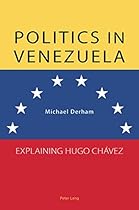Politics in Venezuela: Explaining Hugo Chávez

| Author | : | |
| Rating | : | 4.69 (814 Votes) |
| Asin | : | 303430109X |
| Format Type | : | paperback |
| Number of Pages | : | 346 Pages |
| Publish Date | : | 2015-12-01 |
| Language | : | English |
DESCRIPTION:
He is now a Senior Lecturer in Spanish and Latin American Studies at Northumbria University in Newcastle. About the Author The Author: Michael Derham studied classical archaeology, ancient history and Hispanic studies at Liverpool University. He wrote a doctoral thesis on Spanish immigration into Venezuela and its 1950s political context, in the School of Latin American Studies at Liverpool University.
Bud O'Baer said Dr. Derham is a 1st class historian. Dr. Michael Derham has certainly done a great deal of research and traveling in the course of writing his wonderful book on Venezuela. I would highly recommend this work to anyone interested in the politics, economics and culture of South America.
He wrote a doctoral thesis on Spanish immigration into Venezuela and its 1950s political context, in the School of Latin American Studies at Liverpool University. He is now a Senior Lecturer in Spanish and Latin American Studies at Northumbria University in Newcastle. . The Author: Michael Derham studied classical archaeology, ancient history and Hispanic studies at Liverpool U
However, a lot of the criticism and reporting lacks context. It also shows how Venezuela’s Antagonistic State, between 1958 and 1998, led to the destruction of a whole political and economic elite.. Why is Chávez so loud and outspoken? If he is so bad, why does he keep getting elected? Does he really have the backing of a majority? Is he destroying democracy in his own country and creating division and strife? This book not only answers these questions, and others, such as why, in Venezuela, the 1950s dictatorship of Marcos Pérez Jiménez is often claimed to have worked better than democracy. He is dismissed academically as a ‘populist’ and dismissed more generally as a rabble rouser whose anti-American outbursts threaten regional stability, at the least. Hugo Chávez is heavily criticised by the international political class and the press and media. Outside the country, not much is known about modern Venezuela and even less about the history from which today’s reality has emerged
